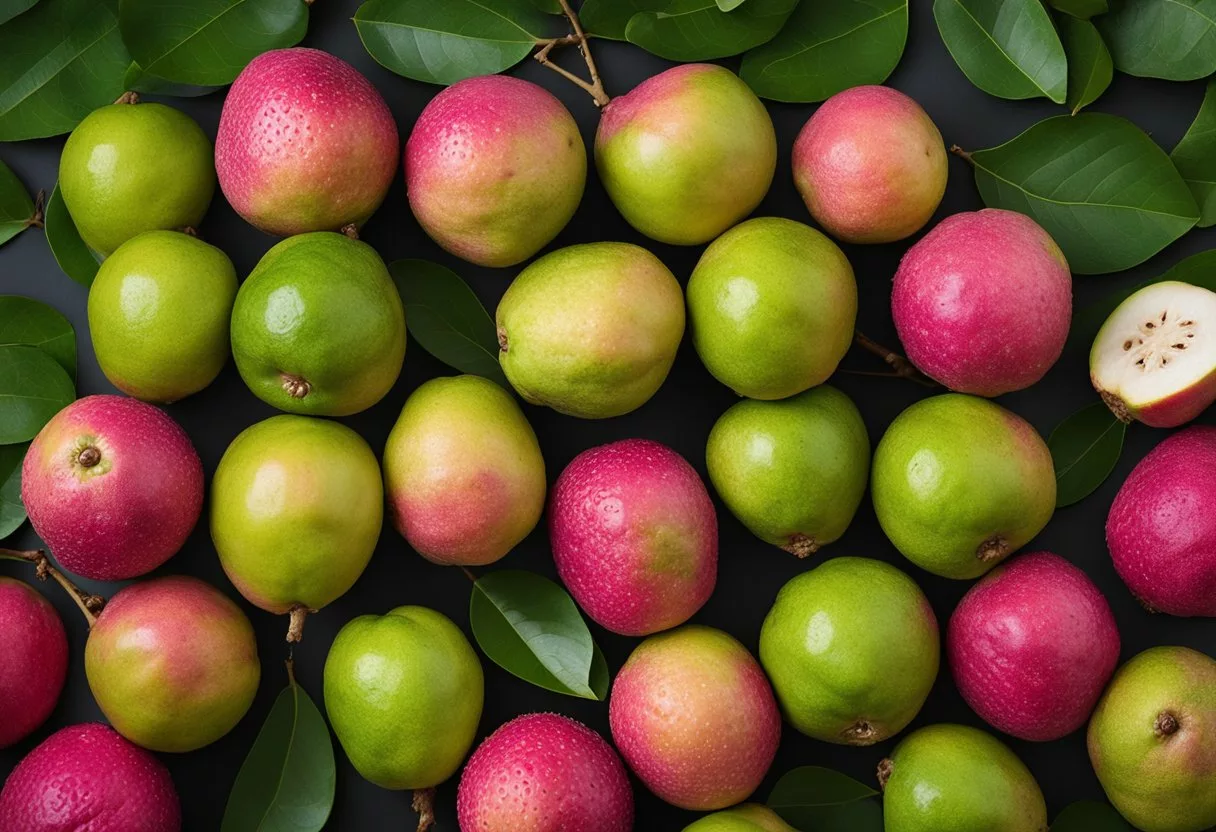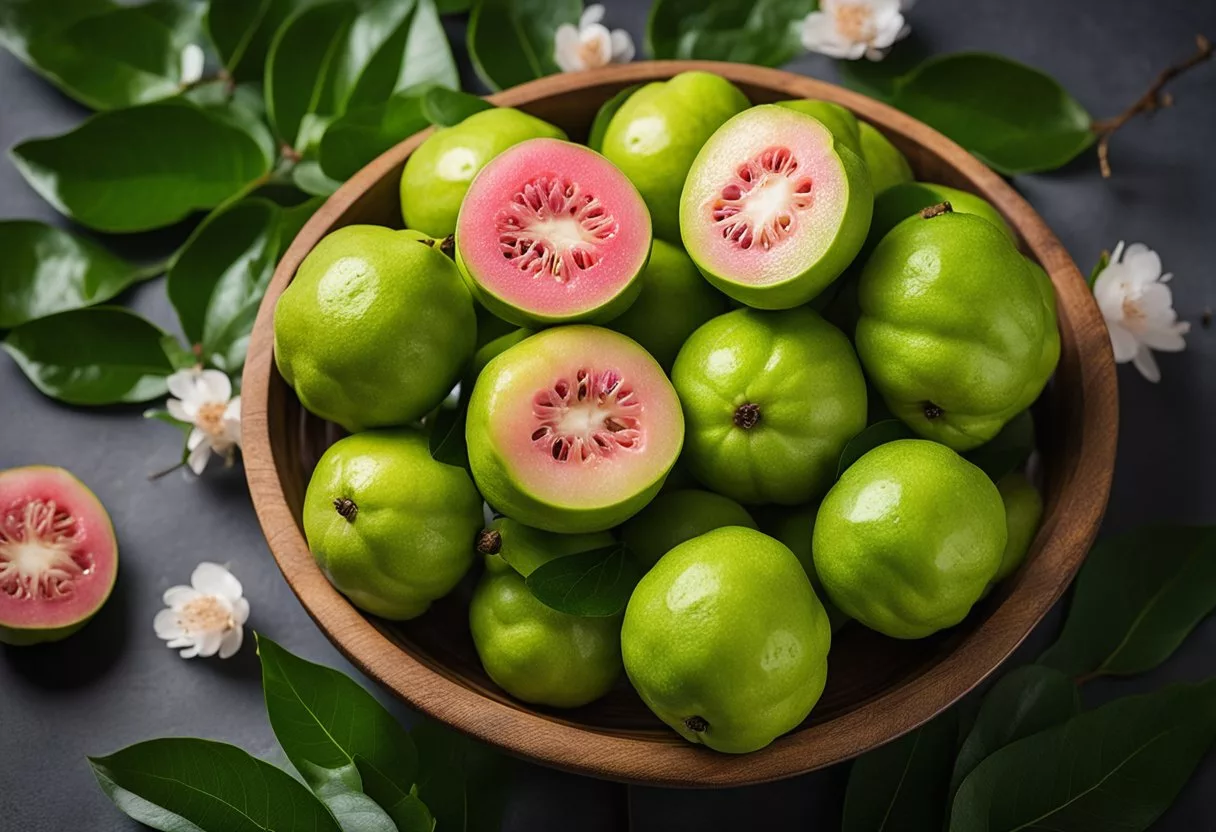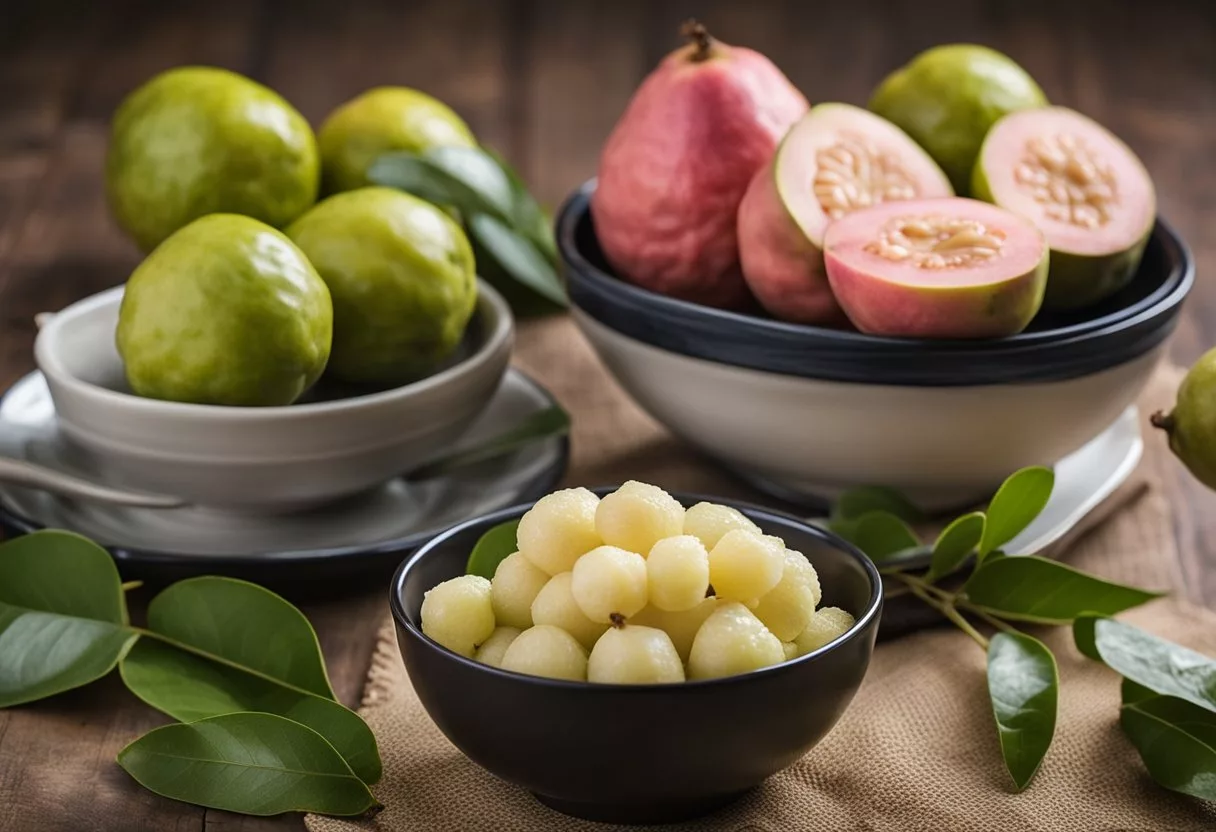Guava is a tropical fruit that stands out due to its numerous health benefits. Packed with vitamins and minerals, this fruit is a powerhouse of nutrition. Guavas are an excellent source of vitamin C and can also help with blood sugar regulation. These benefits make guavas not only a tasty treat but also a valuable addition to a balanced diet.

The fruit is rich in antioxidants, which can protect your cells from damage. Guavas can also support heart health, aid in digestion, and even help with weight loss. The leaves of guava trees have their own unique benefits, such as reducing inflammation and fighting off bacteria, making them useful for various therapeutic purposes.
Guava is versatile and can be eaten fresh, turned into juice, or used in cooking. Adding guava to your diet can boost your overall health and well-being. This makes it a fruit worth including in daily meals for anyone looking to improve their nutritional intake.
Key Takeaways
- Guavas are an excellent source of vitamin C and help regulate blood sugar.
- The leaves have therapeutic properties such as reducing inflammation and fighting bacteria.
- Guava can be used in various ways to support overall health and a balanced diet.
Nutritional Profile of Guavas

Guavas are rich in essential nutrients, making them a valuable addition to any diet. They provide a variety of vitamins, minerals, and other important dietary components.
Vitamins and Mineral Content
Guavas are loaded with Vitamin C, providing more than three times the recommended daily intake in a single fruit. This vitamin acts as a powerful antioxidant, helping to protect the body from harmful free radicals.
They also contain significant amounts of potassium, which is vital for maintaining heart health and regulating blood pressure. Additionally, guavas offer smaller amounts of vitamins such as B6, E, and K, as well as minerals like magnesium and copper.
Caloric and Sugar Breakdown
A 100-gram serving of guava fruit roughly contains 68 calories. This low caloric value makes it an excellent choice for those looking to manage their weight.
In terms of sugar content, guavas have about 14.3 grams of carbohydrates, with the majority coming from natural sugars. Despite this, their overall glycemic index ranges between 12-24, marking them as a low-sugar fruit suitable for people monitoring their blood sugar levels.
Fiber and Protein Contributions
Guavas are exceptional in their dietary fiber content, providing about 9 grams of fiber per 1-cup serving. This high fiber content aids digestion and can help maintain a healthy gut.
They also contribute protein, approximately 2.5 grams per 100 grams. While this might not seem substantial, it’s noteworthy considering most fruits have minimal protein. The combination of fiber and protein helps in satiety and supports overall digestive health.
Health Benefits of Consuming Guavas

Guavas are packed with numerous health benefits that can positively impact different aspects of your well-being. They are rich in vitamins, antioxidants, and other essential nutrients that help in boosting immunity, improving digestion, and enhancing heart health.
Boosting the Immune System
Guavas are a great source of vitamin C, which is essential for boosting the immune system. A single guava provides over 200% of the daily recommended intake of vitamin C. This vitamin helps in fighting off infections and keeping your immune system strong. Additionally, guavas contain antioxidants that protect the body from harmful free radicals. These antioxidants support the immune system by reducing inflammation and protecting cells from damage.
Aiding Digestion
Guavas are high in dietary fiber, which aids digestion and helps maintain healthy bowel movements. Fiber is known to prevent constipation by adding bulk to the stool, making it easier to pass. A single guava contains about 12% of the recommended daily fiber intake. Moreover, guava leaves have anti-bacterial properties that can help prevent digestive infections. Consuming guava regularly can promote a healthy gut microbiome, reducing the risk of gastrointestinal issues.
Improving Heart Health
Guavas contribute to heart health in various ways. They are rich in potassium and soluble fiber, both of which help regulate blood pressure and cholesterol levels. Potassium helps to counteract the effects of sodium, reducing hypertension. Soluble fiber, on the other hand, binds to cholesterol and helps remove it from the body. Regular consumption of guavas can lower the risk of cardiovascular diseases by improving lipid profiles and reducing overall inflammation.
Managing Blood Sugar Levels
Guavas have a low glycemic index, which makes them suitable for people with diabetes. They help in controlling blood sugar levels due to their high fiber content that slows down sugar absorption. Some studies indicate that certain compounds in guavas can improve insulin sensitivity, aiding in better blood sugar regulation. Additionally, guava leaves’ extract is found to have anti-diabetic properties, making it useful for managing blood sugar levels effectively.
Anti-Cancer Properties
Guavas contain antioxidants like lycopene, quercetin, and vitamin C that have anti-cancer properties. Lycopene, in particular, is known for its ability to reduce the risk of several types of cancer. These antioxidants work by neutralizing free radicals, which can cause cell damage and lead to cancer. Guavas also have anti-inflammatory properties that further contribute to reducing the risk of cancer. Incorporating guavas into your diet can provide a protective effect against cancer development.
Skin Health Enhancement
Consuming guavas can also improve skin health. The high levels of vitamins A and C in guavas help in maintaining healthy skin. Vitamin C is crucial for collagen production, which keeps the skin firm and youthful. Additionally, the antioxidants present in guavas protect the skin from damage caused by UV rays and pollution. Guava leaves can be used topically to treat acne and other skin conditions, thanks to their anti-inflammatory and anti-bacterial properties. Regular consumption of guavas can lead to clearer and more radiant skin.
Guavas in a Balanced Diet

Guavas are an excellent addition to a balanced diet due to their high nutrient content and versatility in meals. They can support weight management and be easily incorporated into various recipes, but it’s also important to be aware of potential allergies and interactions with medications.
Weight Management
Guavas are low in calories and rich in dietary fiber, making them ideal for those looking to manage or lose weight. The fiber can help you feel full longer, reducing the tendency to overeat. The fruit contains around 68 calories per 100 grams, which is relatively low compared to many other fruits.
The natural sweetness of guavas also makes them a healthy alternative to sugary snacks. Including guavas in your diet can help satisfy sweet cravings without the added sugars and unhealthy fats found in processed snacks.
Incorporating Guavas into Meals
There are many ways to incorporate guavas into your daily meals. You can eat them fresh, straight out of the peel, or add them to smoothies for a nutrient boost. In salads, guavas pair well with other fruits like strawberries and mangoes.
For breakfast, consider guava slices on top of yogurt or mixed into oatmeal. Guava juice can also be a refreshing drink but be mindful of any added sugars. For a savory option, guavas can be used in salsas and chutneys, providing a sweet and tangy flavor to dishes.
Potential Allergies and Interactions
While guavas are healthy for most people, some may experience allergies. Symptoms can include itching, swelling, or difficulty breathing. It’s best to consult with a healthcare provider if you experience any adverse effects after eating guavas.
Guavas can also interact with certain medications. For example, they might affect blood sugar levels, which is important for those taking diabetes medications. Always consult with a healthcare professional before making significant changes to your diet, especially if you have underlying health conditions or are taking medication.
Therapeutic Uses of Guava Leaves

Guava leaves have been used for their medicinal properties, addressing a range of health issues including diarrhea, menstrual cramps, blood pressure, and cholesterol management. Whether consumed as tea or extracts, their benefits are supported by various studies and traditional practices.
Treating Diarrhea and Menstrual Cramps
Guava leaves are known to help stop diarrhea. They contain antimicrobial properties, which help fight bacteria that cause diarrhea. To use, boil guava leaves in water and drink the tea. This can help reduce stomach pain and frequency of stools.
For menstrual cramps, the leaves have pain-relieving properties. They can ease discomfort when consumed as tea. They also have flavonoids and polyphenols, which help reduce inflammation and pain.
Lowering Blood Pressure and Cholesterol
Guava leaves can help manage blood pressure. The leaves contain compounds like potassium, which help lower high blood pressure. Potassium helps relax blood vessels, improving blood flow.
In terms of cholesterol, guava leaves can reduce levels of LDL, or “bad” cholesterol. Drinking guava leaf tea regularly can help improve cholesterol numbers. This can reduce the risk of heart disease. The antioxidant properties of the leaves also protect the heart and blood vessels from damage.
Guava Leaf Tea and Extracts
Guava leaf tea is an easy way to enjoy the benefits of these leaves. To prepare, steep the leaves in hot water and drink. This tea can aid digestion, boost the immune system, and improve skin health due to its high vitamin content.
Guava leaf extracts are also popular. These can be found in capsules or liquid form. Extracts are a concentrated form, making them a potent option for treating various health conditions. They contain the same beneficial compounds as the leaves and teas, offering a convenient alternative for those who prefer supplements.
Frequently Asked Questions
Guava provides several health benefits, from enhancing skin health to supporting general wellness. It is important to know how guava can contribute to specific aspects of health and whether it might not be suitable for everyone.
What potential skin improvements can one experience by consuming guava?
Guava is rich in vitamin C and antioxidants which can help in reducing wrinkles and promoting collagen production. The nutrients present in guava might also help in reducing acne and brightening the skin.
How does the regular intake of guava affect overall daily health?
Eating guava regularly can support heart health and help regulate blood pressure due to its potassium and sodium content. It is also beneficial for blood sugar control, making it a good option for people monitoring their glucose levels.
Can guava be considered a superfood, and if so, why?
Guava is often considered a superfood because it is packed with essential vitamins, minerals, and antioxidants. It contains more than 100% of your daily vitamin C needs and also offers a good amount of dietary fiber, making it a nutrient-dense choice.
Are there any specific populations or conditions for which guava consumption is not recommended?
While guava is generally safe for most people, those with specific allergies or sensitivities should avoid it. Additionally, excessive consumption could potentially interfere with certain medications or conditions like Irritable Bowel Syndrome (IBS).
What are the sexual health benefits associated with guava leaves?
Guava leaves are known to have properties that may enhance sexual health. They are believed to improve blood flow and circulation, which can be beneficial for sexual function. Some studies suggest they might help in combating certain sexual dysfunctions.
What are the distinctive benefits of guava leaves for women’s health?
Guava leaves are reputed to offer benefits specifically tailored to women’s health such as easing menstrual pain. The anti-inflammatory properties of these leaves might help in reducing pain and discomfort associated with menstruation.